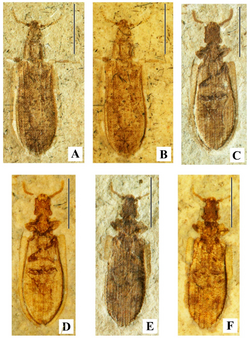Biology:Pareuryomma
| Pareuryomma | |
|---|---|

| |
| Pareuryomma angustum (top left, centre) and Pareuryomma tylodes (top right, bottom) | |
| Scientific classification | |
| Domain: | Eukaryota |
| Kingdom: | Animalia |
| Phylum: | Arthropoda |
| Class: | Insecta |
| Order: | Coleoptera |
| Family: | Ommatidae |
| Genus: | †Pareuryomma Tan et al., 2012 |
| Species | |
| |
| Synonyms | |
|
Euryomma Tan et al. 2006 | |
Pareuryomma is an extinct genus of ommatid beetle. It is known from three species, P. angustum, P. cardiobasis and P. tylodes, all known from the Aptian aged Yixian Formation of China. The genus was first described in 2012, and formerly included the species Pareuryomma ancistrodonta from the Middle Jurassic Jiulongshan Formation, China,[1] which was transferred to the genus Omma in 2020. The species P. angustum was formerly thought to be part of Brochocoleus. The genus is characterised by "slender body, long and subparallelsided or slightly narrowed head with moderately prominent eyes and more or less prominent temples, narrow pronotum with more or less explanate lateral carinae, elytra with the veins more or less well expressed and independently ending on Sc, large cells more or less arranged in rows on disc and moderately widely explanate sides of the elytra, and abdominal ventrites co-planar."[2]
References
- ↑ Tan, Jingjing; Wang, Yongjie; Ren, Dong; Yang, Xingke (2012). "New fossil species of ommatids (Coleoptera: Archostemata) from the Middle Mesozoic of China illuminating the phylogeny of Ommatidae". BMC Evolutionary Biology 12 (1): 113. doi:10.1186/1471-2148-12-113. ISSN 1471-2148. PMID 22776212.
- ↑ Kirejtshuk, Alexander G. (2020-02-17). "Taxonomic Review of Fossil Coleopterous Families (Insecta, Coleoptera). Suborder Archostemata: Superfamilies Coleopseoidea and Cupedoidea". Geosciences 10 (2): 73. doi:10.3390/geosciences10020073. ISSN 2076-3263.
Wikidata ☰ Q99774750 entry
 |

